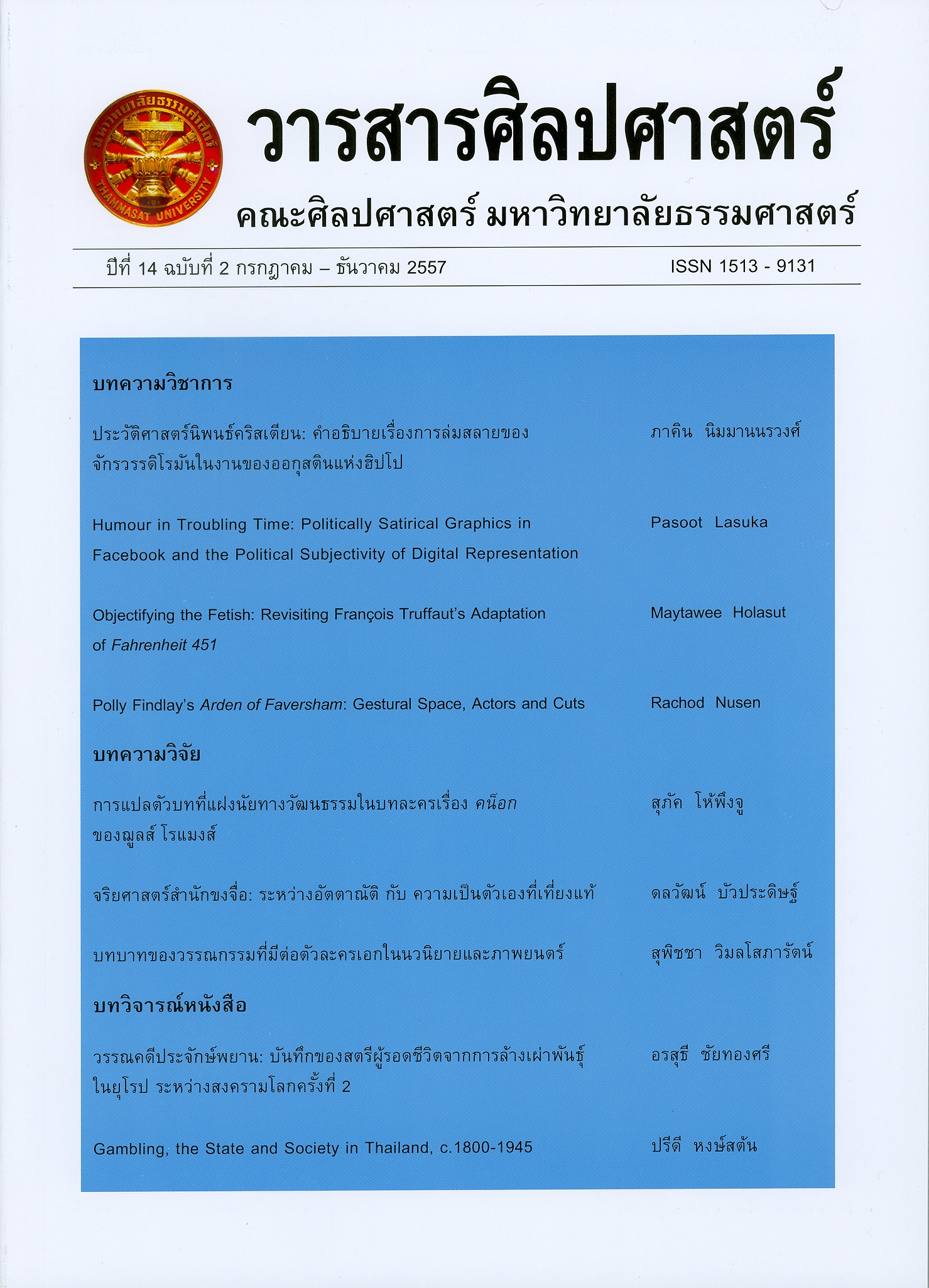บทบาทของวรรณกรรมที่มีต่อตัวละครเอกในนวนิยายและภาพยนตร์
Main Article Content
บทคัดย่อ
งานวิจัยที่เกี่ยวกับการอ่านและบทบาทของวรรณกรรมที่มีต่อชีวิตมีมากมายหลายเรื่อง หากแต่ในงานวิจัยชิ้นนี้ผู้วิจัยมุ่งที่จะศึกษาและวิเคราะห์ถึงบทบาทของวรรณกรรมที่มีต่อตัวละครเอกทั้งในนวนิยายและภาพยนตร์ โดยคัดเลือกเรื่องเล่าที่นำมาใช้ในการศึกษาจากลักษณะนิสัยของตัวละครเอก ซึ่งเป็นผู้ใฝ่ใจในการอ่านหรือหลงใหลในหนังสือ จึงได้เรื่องเล่าที่วรรณกรรมมีบทบาทหลักต่อพัฒนาการของตัวละครเอกและเรื่องราวจำนวน 5 เรื่อง ดังนี้ ฟาเรนไฮต์ 451 เผาหนังสือให้หมดโลก, มาทิลดา นักอ่านสุดวิเศษ, ชายชราผู้อ่านนิยายรัก, เดอะ รีดเดอร์ และหัวใจน้ำหมึก โดยใช้ การวิเคราะห์เชิงพรรณนาผ่านแนวคิดองค์ประกอบของการเล่าเรื่อง พลังของวรรณกรรม และการดัดแปลงสื่อ ผลการวิจัยพบว่า การเล่าเรื่องในนวนิยายและภาพยนตร์สามารถแบ่งตามลักษณะของการเล่าเรื่องได้ 3 ประเภท ดังนี้ 1) วรรณกรรมเป็นจุดเริ่มต้นทำให้เกิดเรื่อง 2) วรรณกรรมมีส่วนในการดำเนินเรื่อง 3) วรรณกรรมเป็นเพียงส่วนหนึ่งของเรื่อง ในด้านบทบาทของวรรณกรรมที่มีต่อตัวละครเอกคือความสามารถในการก่อให้เกิดความรื่นรมย์และจินตนาการ, สร้างความรู้แจ้งให้เกิดขึ้น และเป็นจุดเริ่มต้นในการสร้างความสัมพันธ์ระหว่างตัวละคร ส่วนการดัดแปลงภาพยนตร์จากนวนิยาย ก่อให้เกิดการเปลี่ยนแปลงใน 2 ลักษณะ โดยในตัวเรื่องพบว่ามีการขยายความ ตัดทอน และปรับเปลี่ยนในองค์ประกอบของเรื่องเล่า อย่างไรก็ตาม แก่นเรื่องเป็นส่วนที่คงเดิมไว้ในภาพยนตร์หรือตัวบทปลายทางส่วนตัวละครมีการเพิ่มมิติและบทบาทให้กับตัวละครประกอบ โดยเฉพาะตัวละครที่เป็นผู้ช่วยเหลือตัวละครเอก
There has been a lot of research on reading and the role of literature towards life. This research studied and analyzed the role of literature in developing the protagonists of both novels and films. The stories used in this study were based on characteristics of protagonists who were keen on reading, or who had a passion for books. Five stories are analyzed in which literature played an important role in the development of the protagonists and the story. These stories include: Fahrenheit 451, Matilda, The Old Man Who Read Love Stories, The Reader and Inkheart. The methods used were drawn from textual analysis focusing upon 3 concepts: consistency of narrative components, power of literature and adaptation.
The results showed that narrations in novels and films could be divided into 3 types according to narrative characteristics as follows: 1) Literature causes the story’s beginning, 2) Literature is involved in running the story and 3) Literature is part of the story.
The roles of literature that affects the protagonists are the ability to compose stories and describe characters, create knowledge to happen and cause pleasure and imagination.
Adapted films from novels cause two ways of change. The story is extended, cut down or modified in the elements of the story. However, the theme remains unaltered as the original in the film. For minor characters, especially those who help the protagonists, they have more dimensions and roles.


